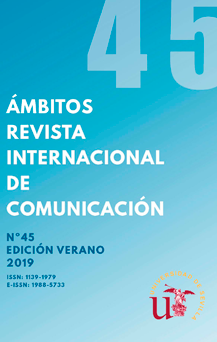La metodología de la concienciación feminista en la época de las redes sociales
DOI:
https://doi.org/10.12795/Ambitos.2019.i45.14Keywords:
redes sociales, feminismo, metodología, epistemologíaAbstract
La concienciación es una metodología feminista cuyo nombre se originó en los grupos de mujeres que se formaron en Estados Unidos en la década de los setenta. En ellos cada mujer presentaba su vida. Algunos se movían por temas, como la maternidad, la imagen física o las relaciones sexuales, otros leían libros y compartían bibliografía, y otros ayudaban a las mujeres en momentos difíciles. Como sostiene Ana de Miguel, en nuestros días las redes sociales están permitiendo la formación de grandes grupos de diálogo entre mujeres en los que se comparten experiencias de la vida y conocimientos, en una escala sin precedentes.
Concluimos que, a pesar de las diferencias, el feminismo actual (cuarta ola) comparte con el feminismo de los setenta (segunda ola) su elemento central: el método de la concienciación. En los nuevos grupos “difusos” de concienciación de la era digital se reproducen de forma espontánea las características clásicas del método epistemológico del feminismo se segunda ola. El resultado es la conciencia de “clase sexual” que constituye el germen de la acción colectiva. De los grupos de concienciación de los setenta emergieron conceptos fundamentales del feminismo como el de patriarcado o el de clase sexual. Si el feminismo de los años setenta fue revolucionario, el feminismo de nuestros días, gracias al alcance comunicativo de las nuevas tecnologías, tiene un potencial muy superior.
Downloads
References
Brownmiller, S. (2000). In Our Time: Memoir of a Revolution. London: Aurum Press Ltd.
Colectiva Mujeres de Boston (1976). Nuestros cuerpos, nuestras vidas. Cali: Colectivo de Mujeres de Cali.
De miguel, A. (2015). Neoliberalismo sexual. El mito de la libre elección. Madrid: Cátedra.
Eyerman, R. y Jamison, A. (1991). Social Movements. A Cognitive Approach. Pensilvania. The Pensilvania State University Press.
Firestone, S. (1979). La dialéctica del sexo. El defensa de la revolución feminista. Barcelona: Kairós.
Freeman, J. (1988). La Tiranía de la Falta de Estructuras. Madrid: Forum de política feminista.
Fricker, M. (2007). Injusticia epistémica. Barcelona: Herder.
Gadamer, H. (2013). Verdad y método. Salamanca: Sígueme.
Posada, L. (2014) Teoría queer en el contexto español. Reflexiones desde el feminismo. Daimon. Revista Internacional de Filosofía. 63, 147-158.
MacKinnon, C. (1995). Hacia una teoría feminista del Estado. Madrid: Cátedra.
Mccarthy, J. y Zald, M. (1977). Resource mobilization and social movements: A Partial Theory. American Journal of Sociology. 82, 1212-1241.
Melucci, A. (1994). ¿Qué hay de nuevo en los nuevos movimientos sociales? En E. Laraña y J. Gusfield (Eds.), Los nuevos movimientos sociales. Madrid: CIS.
Millett, K. (2010). Política sexual. Madrid: Cátedra.
Rowbotham, S. (1973). Women's Consciousness, Man's World. Baltimore: Penguin.
Tax, M. (1970). Woman and Her Mind, The Story of Daily Life. Boston: Bread and Roses.
Westchester Radical Feminists. (1972). Statement of Purpose, May, 1972. Koedt , Levine y Rapone, Radical Feminism. 385-386.
Downloads
Published
How to Cite
Issue
Section
License
Ámbitos. Revista Internacional de Comunicación is an open access journal, which means that all content is freely available at no charge to the user or their institution. Users may read, download, copy, distribute, distribute, print, search or link to the full text of articles, or use them for any other lawful purpose, without seeking prior permission from the publisher or author. This definition of open access is in accordance with the Budapest Open Access Initiative (BOAI).

Unless otherwise noted, all content in the electronic edition is distributed under a "Creative Commons Attribution-NonCommercial-ShareAlike 4.0 International License". You can consult the informative version and legal text of the licence here. This should be expressly stated in this way where necessary.
In case of acceptance of the manuscript, the authors cede the rights of the work for its publication to Ámbitos. Revista Internacional de Comunicación under the Attribution-NonCommercial-ShareAlike 4.0 International license contract (CC BY-NC-SA 4.0). The authors retain copyright and third parties are authorised to copy, distribute and make use of the work, provided they comply with the terms and conditions set out in the licence
- Cite the authorship and the original source of publication (journal, publisher and URL of the work).
- Do not use them for commercial purposes.
- If you remix, transform or create from the material, you must release your contributions under the same license as the original.
More information can be found at https://creativecommons.org/licenses/by-nc-sa/4.0/deed.es


















